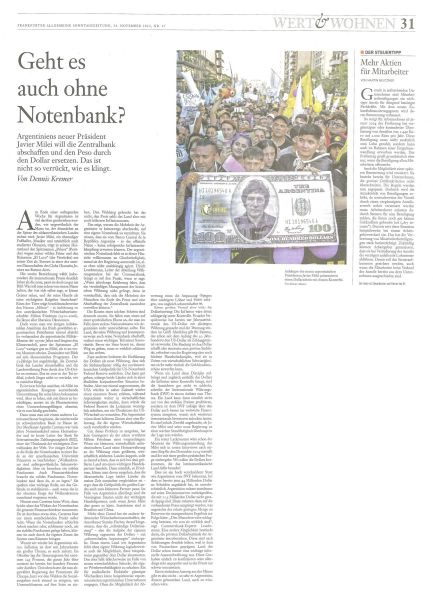The Art of Changing Currencies
I saw this article in the Frankfurter Allgemeine newspaper in November of last year. The title of it, "Geht es auch ohne Notenbank?" translates roughly, "Can you govern a country with no central bank?" Observers monitoring conditions in the South American nation, Argentina, ask themselves this question. Argentina's leaders not only want to restructure the nation's Central Bank, they want to discontinue the traditional Peso in favor of the U.S. Dollar.
The new (since 2019) President of Argentina Javier Milei earned his nickname "el Peluca" (the Wig) like any honest man: He was the lead-singer in a rock-and-roll band and a goal-tender for a semi-pro soccer team in Buenos Aires. He is now 53-years-old. His overall assertiveness and boisterousness in school earned him another nickname "el Loco", (the crazy one). Milei studied economics in college and obtained a bachelor's and two masters degrees. He has worked in pension-fund management, investment management, and mediated investor disputes.
Milei claims to receive policy-advice from his dog "Milton", named for Nobel-laureate economist Milton Friedman. People scoff at Milei's eccentricities, but "Milton'' has apparently suggested something radical, that his namesake put forward years ago--tie Argentina's Peso currency to that of a more powerful nation, with whom it has a good trading relationship.
But Milei wants to take it a step further and simply replace the Argentine Peso with the Dollar. He also wants to disband Argentina''s Central Bank and revamp it on the American model, to make it independent of political influences. The Argentine Central Bank has done little to roll back the high inflation that cripples the nation's ability to support itself, and that offers favors to its political constituencies to win votes for the Peronist Party.
Critics murmur "El Loco!" and shake their heads. The article suggests, however, that the idea is not as crazy as it seems. For one thing, changing a nation's currency is hardly new. Even the U.S. changed currencies after it discarded the unsuccessful Articles of Confederation, which stressed state currencies, and moved to the U.S. Constitution, which instituted a federal style of government with a single U.S. Dollar currency.
Since reading the Frankfurter Allgemeine article, I have wondered what steps Argentina--but basically any nation--would undertake in order to see the transition through? The article poses the dilemma to its readers, "A nation that gives up its own currency, in order to use someone else's, surrenders a defining aspect of its sovereignty."
The step could cause some pushback against dollarization, since Argentine banks will find themselves dependent on America's Federal Reserve system, as it assumes oversight for Argentine economic policy; but Argentines have already expressed loss of confidence in their nation's own Central Bank, since it remains susceptible to political intervention.
I remember when I visited England for the first time in the Summer of 1968, when I was still in high school, England had just undertaken to move its currency from the old Roman system to a decimal system. The old British pound still uses an archaic "£" to signify the Roman "Libra", which Americans still represent as "lb". The old British pence descended from the Roman name for it "Denarius", so the British denoted the six-pence coin with a "6d". The old six-pence coin transitioned gradually to a new 5-p coin, and the old Shilling became the new 10-p coin. They did it gradually, in order to ruffle fewer feathers. If Argentina expects success from implementing the Dollar, in place of the Peso, it will have to allow a transition, giving both currencies a legitimate parity for a time.


